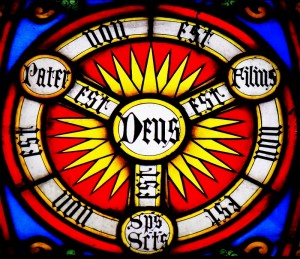 The doctrine of the Trinity seems to many Christians to be the most obscure and arcane of the Church’s dogmas. In contrast, Christmas is the holiday that more than any other stirs the emotions of followers of Jesus, regardless of denominational affiliation, inspiring them to acts of charity and service to others. What, then, could the seemingly rationalistic doctrine of the Trinity possibly have to do with the divine love we experience and celebrate at Christmas?
The doctrine of the Trinity seems to many Christians to be the most obscure and arcane of the Church’s dogmas. In contrast, Christmas is the holiday that more than any other stirs the emotions of followers of Jesus, regardless of denominational affiliation, inspiring them to acts of charity and service to others. What, then, could the seemingly rationalistic doctrine of the Trinity possibly have to do with the divine love we experience and celebrate at Christmas?
A pointer in the direction of answering this question may be found in the oft-overlooked second stanza of the Christmas carol, “O Come, All Ye Faithful.” The author writes, “God of God, light of light / Lo, he abhors not the Virgin’s womb; / Very God, begotten, not created: / O come let us adore Him / Christ the Lord.” Those familiar with church history will quickly recognize in this stanza echoes of the Nicene Creed from AD 325: “We believe . . . in one Lord Jesus Christ, the Son of God, begotten of the Father . . . Light of Light, very God of very God, begotten, not made, being of one substance (homoousios) with the Father.”
So why would someone think it fitting to include allusions to the Nicene Creed in a Christmas carol? The answer in brief is this: the message of Christmas is that God is with us in Jesus, and the doctrine of the Trinity tells us that it is God Himself who is with us.
Christmas is about the gift of God to humanity in the sending of His Son into the world in a humble stable. So great is this gift that this child is called “Emmanuel,” meaning “God with us” (Matthew 1:23). But here we encounter something of a problem. God certainly had not been completely absent prior to this point in human history. Most importantly He had spoken through the prophets of Israel and filled the Jerusalem temple with His presence. And yet the nativity accounts in the Gospels seem to suggest that there is something new, something unique, about the presence of God in the person of the infant in Bethlehem. What then is new about God’s presence “with us” in Jesus, Emmanuel? The newness lies in the fact that in Jesus, God Himself steps into world history in human form, showing His solidarity with us in the most profound and intimate way, from the passage through the birth canal to the ignominy of a criminal’s death and everything in between.
Now at this point certain theologians, both ancient and modern, are tempted to draw back. In the ancient world Arians asserted that Jesus wasn’t equal with the Father. In the modern world, Jehovah’s Witnesses and Muslims make similar claims. But the Nicene doctrine of the Trinity, at root, asserts that Jesus is as much divine as is His Father, sharing the undivided will, power, and authority that belong to God alone. As a result, the classical doctrine of the Trinity insists that the one who came forth from Mary in human flesh was, in the language of the creed, “very God,” not some lesser divine being, or a God-in-the-making.
In summary, we might say that you’re not really able to say that Jesus is “God with us” unless you accept that Jesus is Himself fully God. In other words, unless Jesus is homoousios with the Father, He can’t really be Emmanuel. The doctrine of the Trinity, therefore, provides the deep roots that support and sustain the event we celebrate at Christmas.
//